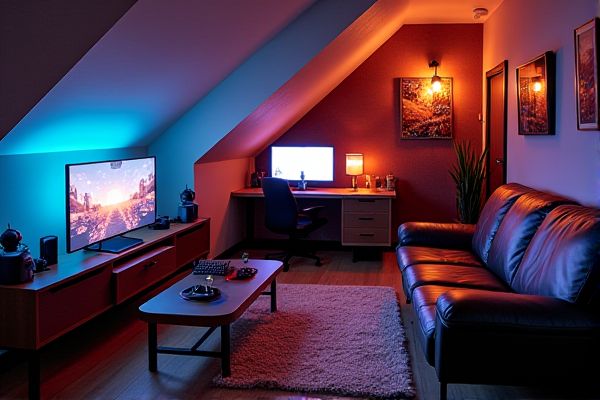
An attic gaming corner offers a dedicated, immersive space that minimizes distractions, while living room gaming provides a more social and accessible environment for multiplayer experiences. Discover which setup best suits Your gaming style and space by reading the rest of the article.
Table of Comparison
| Feature | Attic Gaming Corner | Living Room Gaming |
|---|---|---|
| Space | Compact, dedicated area | Larger, shared space |
| Privacy | High, isolated environment | Low, open and social |
| Noise Levels | Controlled, minimal disturbance | Potentially high, social noise |
| Lighting | Customizable, often darker | Natural and ambient light |
| Comfort | Personalized seating and setup | General furniture, less tailored |
| Internet Connectivity | May require extender for strong signal | Generally better router placement |
| Decor | Personalized gamer aesthetics | Mixed decor, family-oriented |
| Social Interaction | Limited, mostly solo gaming | Enhanced, multiplayer and parties |
| Setup Complexity | Requires planning and optimization | Flexible, plug-and-play |
Introduction: Choosing the Perfect Gaming Spot
Attic gaming corners offer a cozy, secluded environment that enhances focus and minimizes distractions compared to living room gaming, where noise and shared space can interrupt gameplay. Your attic setup can be customized with soundproofing and ambient lighting to optimize immersion and comfort. Prioritizing your personal gaming experience, the attic ensures a dedicated retreat unlike the often cluttered and multi-purpose living room area.
Space Utilization: Attic vs Living Room
Attic gaming corners maximize space utilization by transforming underused areas into dedicated gaming zones, offering quiet, private environments free from household distractions. Living room gaming setups often compete with other activities and furniture, limiting spatial flexibility and leading to possible clutter or compromised comfort. Optimizing attic spaces typically results in ergonomic arrangements tailored for gaming, while living rooms require multifunctional designs balancing gaming with social or entertainment needs.
Ambiance and Lighting Considerations
Attic gaming corners offer a unique ambiance with cozy, often customizable lighting that enhances immersion and reduces glare, making it ideal for focused gameplay sessions. In contrast, living room gaming areas typically feature brighter, more ambient lighting suitable for social play but may cause screen reflections or distractions. Your choice should balance lighting control and atmosphere to optimize comfort and visual clarity during gaming.
Privacy and Noise Levels
An attic gaming corner offers enhanced privacy by isolating your gaming space from the main living areas, minimizing interruptions and distractions. Noise levels remain contained, preventing sound from disturbing others in the household, which is particularly beneficial for late-night sessions. Your gaming experience becomes more immersive and focused when using an attic setup compared to a living room environment.
Comfort and Furniture Options
Attic gaming corners often offer cozy, customizable spaces with ergonomic chairs and compact desks tailored to maximize limited space, enhancing comfort during extended play sessions. In contrast, living room gaming setups prioritize spacious, multi-functional furniture such as plush sofas and adjustable coffee tables, providing a relaxed and social environment ideal for console gaming with friends or family. Both options present unique furniture choices that cater to different gaming styles, balancing comfort with spatial constraints.
Tech Setup and Connectivity
An attic gaming corner often benefits from dedicated space allowing for a customized tech setup with minimal interference, enabling high-performance PCs, gaming consoles, and multiple monitors to be optimally arranged. Living room gaming setups rely heavily on wireless connectivity and may face challenges with signal interference or limited Ethernet access, potentially impacting latency-sensitive games. Your choice between these environments greatly influences the stability of internet connections, audio-visual equipment quality, and overall gaming immersion.
Accessibility and Convenience
An attic gaming corner offers a dedicated, quiet space free from household distractions, enhancing your focus and immersion. However, limited access and potential temperature fluctuations may impact comfort and convenience compared to a living room setup. Living room gaming provides easy accessibility and shared social interaction but often competes with other activities and noise, affecting overall gaming experience.
Personalization and Decor Flexibility
Attic gaming corners offer greater personalization and decor flexibility, allowing you to tailor the space with unique lighting, wall art, and custom shelving that reflect your gaming style. Unlike the living room, which often has multifunctional furniture and shared use constraints, an attic can be dedicated solely to gaming, enabling you to create an immersive environment without compromising overall home aesthetics. Your attic setup can evolve with your gaming preferences, making it a versatile retreat designed specifically for your needs.
Social Gaming: Hosting Friends and Family
Attic gaming corners create an intimate environment for hosting friends and family, promoting close-knit social interactions and focused gameplay experiences. Living room gaming offers a spacious setting with comfortable seating arrangements, ideal for larger gatherings and inclusive multiplayer sessions. Both spaces enhance social gaming, but living rooms accommodate more diverse group dynamics and casual entertainment.
Cost and Renovation Factors
Transforming an attic into a gaming corner involves higher renovation costs due to insulation, ventilation, and electrical upgrades compared to setting up a gaming area in the living room. Attic renovations require structural assessments and potential reinforcement, increasing the overall budget significantly. In contrast, a living room gaming setup often demands minimal modification, leveraging existing furniture and electrical outlets to reduce expenses.
 homyna.com
homyna.com